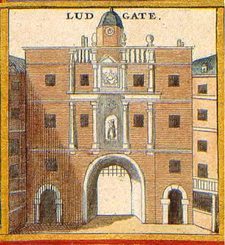

I should think most people’s idea about what a fifteenth century jail was like would be of a damp, dark, cold dungeon. A few wisps of foul straw on the floor. Perhaps a barred window high up. Desperate messages scratched on the walls, or written in blood. An iron door that clanged like the sound of doom when shut on the poor, ragged, half starved inmates. If you were writing a novel and you wanted the maximum drama, that’s the kind of prison your hero would find himself in, right?
Certainly not in Ludgate Gaol.

Ludgate stood partly in Farringdon Ward Within and Farringdon Ward Without. The prison was built in 1378 in the gatehouse, the westernmost gate in London’s walls. It was intended as a prison for Freemen of the city and citizens convicted of non-felonious crimes, and for clergy who were imprisoned for minor offences. As such it was something of a holiday camp. Prisoners elected the warden and essentially ran the prison.
So comfortable was Ludgate that some of the prisoners made no attempt to pay off their debts and leave. This wouldn’t do at all, so in 1419 they were transferred to the much less salubrious Newgate Gaol where they were obliged to mix with a lower class of criminal. This didn’t work though, because Newgate was so overcrowded and unhealthy. Back they went to Ludgate.
A man name Stephen Forster had spent some time in Ludgate for debt. Obviously he was released and flourished because later he was knighted and became Lord Mayor. Circa 1450 Sir Stephen rebuilt the debtor’s prison larger and with a chapel and abolished the practice of making the debtors pay for their own food and lodgings.
The prison was rebuilt in 1586 and again after being destroyed in the great fire, finally closing in the nineteenth century.
Sources:
Academic Dictionaries and Encyclopedias
Wikipedia
A blog dedicated to Empress Elisabeth - Sisi
The World of Historical Fiction
Odds and ends of British history in no particular order
A blog about London and its history...
Historical Fiction with a touch of Romance
Historical Crime & Mystery
welcome to my worlds...
Artist by Day, Book Nerd by Night